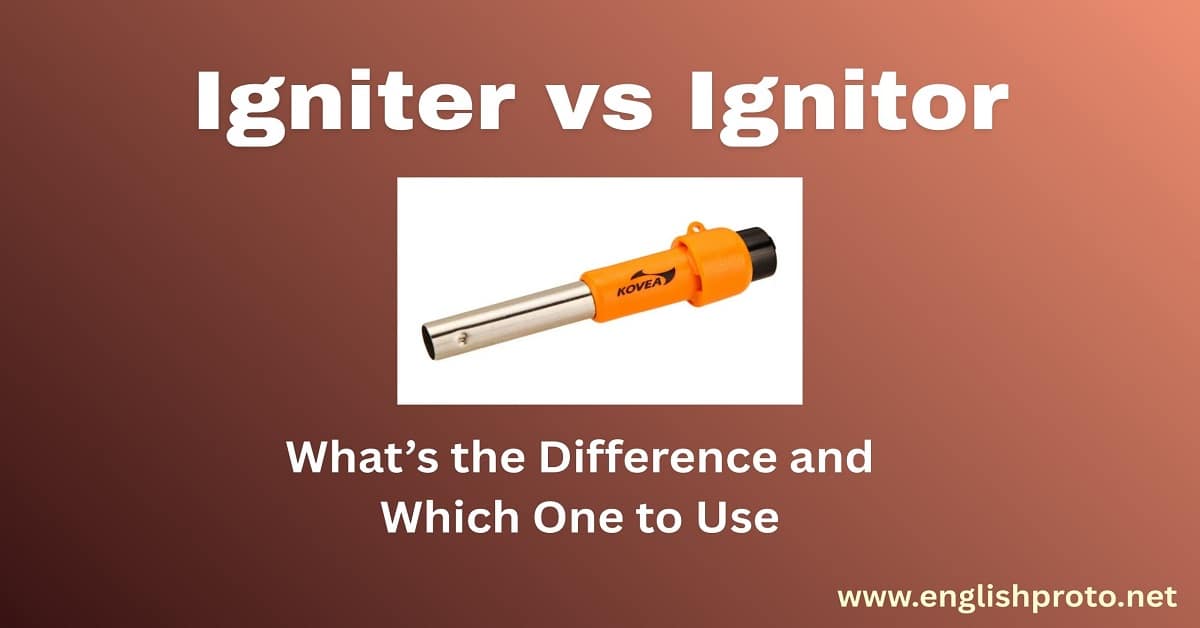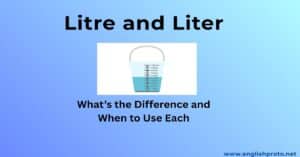Igniter vs Ignitor — whichever way you spell it, this small but mighty device holds the power to spark life into engines, burners, and machines you rely on every day. You may not think about it often, but without an igniter, many of the tools and comforts you use simply wouldn’t work.
If you’ve ever wondered how that spark happens or why choosing the right ignitor matters, you’re in the right place. This article will break it down for you in simple, practical terms so you not only understand it but feel confident when it comes to using or replacing one.
Quick Summary: Igniter vs Ignitor
Both igniter and ignitor refer to the same thing: a device or substance that starts a fire, combustion, or reaction. The difference lies not in meaning, but in spelling preference.
- Igniter is the more widely accepted and standard spelling in modern English, especially in the U.S., U.K., and technical writing.
- Ignitor is an alternative spelling, less common today, though still used in certain industries and product branding.
In short: if you want the spelling most readers will recognize as correct, choose igniter.
Key Takeaways
- Igniter = preferred, standard spelling in dictionaries, academia, and technical documentation.
- Ignitor = variant spelling, sometimes seen in branding or informal use.
- Both spellings are correct, but consistency matters more than personal preference.
- Professional and academic contexts lean heavily toward igniter.
- ⚡ Quick Tip: When in doubt, pick igniter—it aligns with modern style guides.
Reasons for Confusion: Igniter vs Ignitor
Why does this small spelling difference cause so much trouble? Several factors explain the uncertainty:
1. Similar Pronunciation
Both words sound the same. The “-er” and “-or” endings are pronounced alike in most English dialects, so spoken language doesn’t distinguish them.
2. Influence of Other Words
English is filled with nouns ending in -or (actor, generator, conductor) and -er (writer, heater, speaker). Since both endings can indicate “one who does,” people often confuse which suffix applies.
3. Regional Preferences
While igniter dominates globally, certain industries or regions have historically leaned toward ignitor. For example, some American technical manuals from the mid-20th century preferred ignitor.
4. Branding and Marketing
Manufacturers sometimes choose ignitor as a product name for distinctiveness, even if igniter is technically more correct. Over time, these branded spellings influence everyday usage.
5. Legacy Usage in Technical Fields
Older aerospace and engineering documents sometimes favored ignitor. For instance, NASA reports from the 1960s often used “ignitor.” As language modernized, usage shifted toward “igniter,” but confusion lingers.
Detailed Explanation
What Does “Igniter/Ignitor” Mean?
At its core, the word refers to anything that initiates combustion or starts a reaction. Depending on the context, this could mean:
- A small device that produces a spark in engines.
- A chemical compound that triggers an explosive.
- A person who metaphorically sparks enthusiasm or conflict.
Why “Igniter” Is Preferred
Most modern dictionaries—including Merriam-Webster, Oxford English Dictionary, and Cambridge—list igniter as the main spelling. Some note “ignitor” as a variant, but rarely the preferred one.
Style guides like Chicago Manual of Style and Associated Press (AP) also recommend using “igniter.” Academic and technical publications follow suit, since consistency is valued above novelty.
Usage by Context
Here’s how the two spellings stack up in different scenarios:
| Context | Preferred Spelling | Notes |
|---|---|---|
| Academic writing | Igniter | Consistency required |
| Engineering manuals | Igniter (modern), Ignitor (legacy) | Some older texts use “ignitor” |
| Everyday speech/writing | Igniter | Universally understood |
| Branding/Product names | Ignitor | Chosen for style or marketing |
| British English | Igniter | No difference from American English |
⚡ Quick Tip: Unless you’re referencing a specific branded product called “Ignitor,” always use igniter.
Common Errors
Because the two forms are so similar, a few predictable errors appear:
- Mixing spellings in the same document
- ❌ “The ignitor is connected to the igniter system.”
- ✅ “The igniter is connected to the igniter system.”
- Assuming one is British and the other American
- Unlike “color/colour,” this is not a U.S. vs. U.K. difference. Both regions prefer igniter.
- Overgeneralizing -or endings
- Some assume that since “generator” and “conductor” end in -or, “ignitor” must be correct. But suffix rules aren’t universal.
- Using ignitor in formal writing
- While not “wrong,” it looks outdated and inconsistent with dictionaries, which weakens credibility.
Synonyms or Alternatives: Igniter vs Ignitor
If you want to avoid the igniter/ignitor dilemma altogether, you can use synonyms depending on context:
- Starter – informal, general use.
- Spark plug – automotive/engine contexts.
- Initiator – chemical or technical contexts.
- Trigger – broader usage in mechanical or figurative sense.
- Catalyst – metaphorical, often in social or scientific discussions.
⚡ Quick Tip: For technical writing, initiator is the closest alternative in precision.
Examples in Sentences
To solidify the distinction, here are examples showing proper use:
With Igniter (preferred)
- The rocket’s igniter fired successfully, starting the engine burn.
- Please replace the faulty igniter in the furnace before winter.
- The teacher was an intellectual igniter, sparking curiosity in every student.
With Ignitor (variant)
- The company sells a patented “Flame Ignitor 2000.”
- NASA engineers in the 1960s referred to the solid-fuel ignitor in technical reports.
Incorrect Usage
- ❌ The technician repaired the ignitor in the furnace (unless that’s the brand name).
- ❌ He was an ignitor of change in society (sounds nonstandard).
Origins and History
Understanding the roots of these words clears up why the spellings diverged.
- Base Word: Ignite – From Latin ignīre, meaning “to set on fire,” derived from ignis (fire).
- Suffix -er – Common in English for nouns that indicate an agent (writer, painter, igniter).
- Suffix -or – Borrowed from Latin through French, also used for agent nouns (actor, generator).
Both suffixes entered English, which explains the overlap. Historically, igniter emerged first (early 17th century). Ignitor appeared later, modeled after other -or nouns, but never gained dominance.
In modern times, dictionaries have consolidated around igniter as the standard, though “ignitor” persists as a variant.
Extended Discussion: Why Spelling Matters
Some may dismiss the difference as trivial, but spelling choices carry weight:
- In academia: Professors and reviewers expect adherence to dictionary-standard spellings. Using “ignitor” might raise questions.
- In technical manuals: Consistency ensures that engineers, technicians, and operators all interpret instructions correctly.
- In branding: Using “Ignitor” as a product name can be effective for standing out, but shouldn’t influence formal writing.
- In cross-cultural communication: Learners of English rely on consistency. If teachers alternate between “igniter” and “ignitor,” it increases confusion.
⚡ Quick Tip: Always match your audience. For formal, educational, or professional use, stick with igniter.
Broader Examples Across Industries
To appreciate how these words appear in real-world contexts, let’s explore some domains:
Automotive
- Spark plugs often rely on igniters to start combustion. Manuals always use “igniter.”
Aerospace
- Rocket engines contain a pyrotechnic igniter. NASA historically used “ignitor,” but modern space agencies use “igniter.”
Fireworks
- Pyrotechnicians insert electric igniters to ensure controlled explosions.
Household Appliances
- Gas stoves, ovens, and heaters contain igniters commonly referenced in user manuals.
Figurative Language
- A leader may be described as an igniter of innovation or igniter of social change.
FAQs
Q1: Is ignitor wrong?
Not exactly it’s a recognized variant. But it is far less common and may look outdated in formal contexts.
Q2: Which spelling should I use in technical writing?
Always use igniter. Technical standards (engineering, aerospace, safety manuals) favor it.
Q3: Is this a British vs. American difference?
No. Both British and American English prefer igniter.
Q4: Why do some companies use “ignitor” in product names?
Branding. The -or ending sometimes looks stronger or more distinctive.
Q5: Can igniter refer to a person?
Yes, metaphorically. Example: “She was an igniter of creativity in the workplace.”
Q6: Is “ignitors” correct as plural?
Yes, but rarely used. Standard plural is igniters.
Q7: Do other words show the same -er/-or confusion?
Yes: adviser/advisor, traveler/traveller, and others.
Q8: What’s the safest choice in academic essays?
Use igniter.
Q9: Why do some older documents say “ignitor”?
Historical variation. Some mid-20th-century U.S. technical fields favored -or forms.
Q10: Do learners of English need to memorize both?
Not necessary. Focus on igniter as the standard, but recognize “ignitor” if encountered.
Conclusion: Igniter vs Ignitor
At first glance, igniter and ignitor may look like twins separated only by their last two letters. But dig deeper, and you’ll see that igniter is the standard, dictionary-approved form, while ignitor lingers as a variant, mostly in branding or older technical documents.
To recap:
- Igniter = standard, preferred spelling in modern English.
- Ignitor = less common variant, occasionally seen in product names or legacy texts.
- Consistency matters more than personal taste—pick one spelling and use it throughout your work.
- For professional, academic, and technical communication, igniter is the safest and clearest choice.
Language evolves, but clarity remains timeless. By choosing igniter, you align with modern usage, ensure your readers’ understanding, and present yourself as a polished, precise communicator. Whether you’re writing a research paper, a technical manual, or even a blog post, let igniter be the spark that lights up your credibility.



